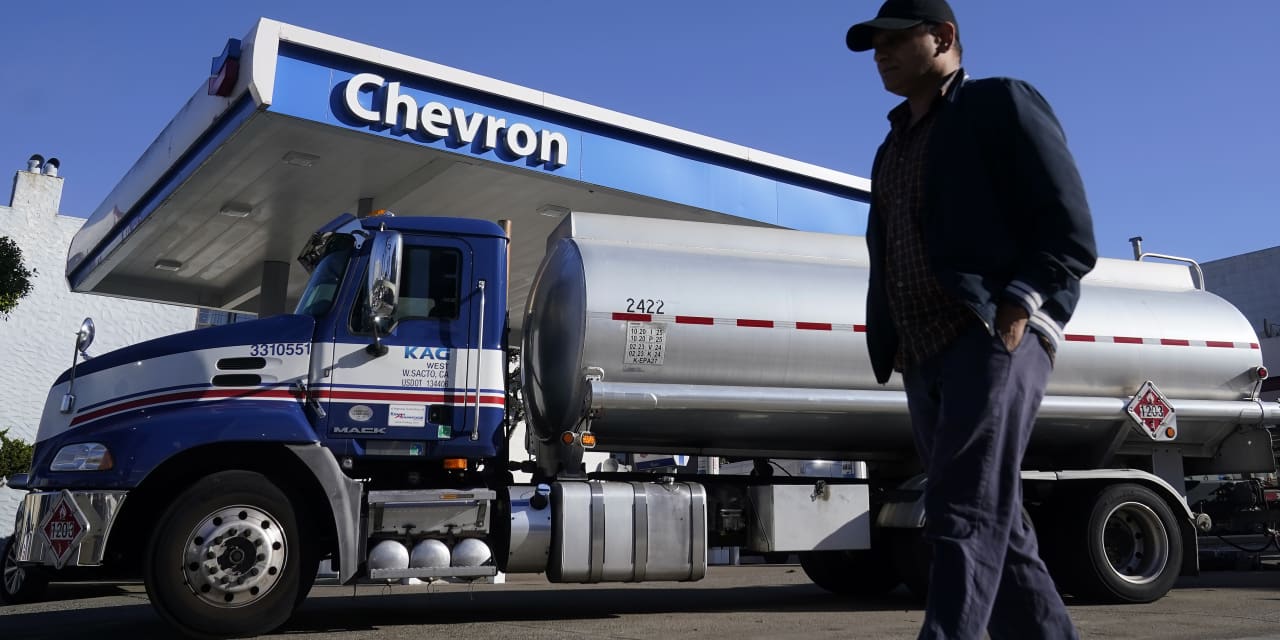In less than a year,
Chevron
has gone from being Wall Street’s favorite Big Energy company to a show-me story. Investors who buy the stock now should end up liking what they see.
Chevron stock (ticker: CVX) has fallen 17% in 2023, making it the worst performer by far among the half-dozen global super majors this year.
Exxon Mobil
(XOM), by comparison, is down just 2% this year, and the
Energy Select Sector SPDR
exchange-traded fund (XLE) is about flat.
Most of the drop has come during the past few weeks after a disappointing earnings report that included news of a surprise delay in the development of a key oil field in Kazakhstan, while Chevron’s $60 billion deal to buy
Hess
(HES), an independent energy producer, not only failed to excite investors but was seen as a sign of weakness by some.
The stock market isn’t so sure. CEO Mike Wirth said the deal “positions Chevron to strengthen our long-term performance and further enhance our advantaged portfolio by adding world-class assets”—chief among them a 30% interest in a massive Guyana field, which contains 11 billion barrels of oil equivalent.
On the other hand, Chevron got a richly valued company with no real overlaps, providing little opportunity for cost cutting. What’s more, there’s no current free cash flow, given investments that Hess is making with its partners to double Guyana production by 2027 from a current 400,000 barrels a day. The all-stock deal will also mean $2 billion of added annual dividend costs. Wall Street is assuming that Hess shareholders will back the deal despite a drop in Chevron’s stock price since the transaction was unveiled in October.
Greg Buckley, a portfolio manager at the Adams Natural Resources fund, says that getting control of the Guyana stake was worth the Hess price given the field’s growth outlook. Chevron seeks to boost its energy production by at least 3% annually through 2027 off a 2022 base.
Making sure that happens falls to Wirth, Chevron’s CEO of the past five years. He emerged as the top big-energy leader as Chevron generated ample returns in recent years with disciplined capital spending, smooth operations, and acquisitions like the $13 billion deal for Noble in 2020, which gave it control of a big gas field off the coast of Israel. In recognition of Wirth’s efforts, Chevron waived its mandatory retirement age for CEOs to allow Wirth, now 63, to continue to work after he turns 65.
Some of the sheen has come off the Chevron story. Chevron has run into issues with two of its most important assets. Earlier this year, the company said it was having some production shortfalls in the Permian, possibly making it harder for Chevron to hit its goal of 1 million barrels a day there by 2025 from about 775,000 now.
Issues have also cropped up in Kazakhstan, where Chevron is the lead operator and 50% owner of a large oil field called Tengiz that produces about 750,000 barrels a day. On its third-quarter conference call, Chevron announced a delay in an important expansion project that would help take production up to a million barrels a day from late 2024 to 2025.
Still, managing complex large energy fields has historically been the forte of Big Oil. Permian and Tengiz may have raised questions about how well Chevron can manage the development of large projects, but Adams Natural Resources’ Buckley thinks Chevron has been “overly punished” and will get back on track.
At Chevron stock’s current price, that’s a bet we’re willing to make.
Write to Andrew Bary at [email protected]
Read the full article here









Leave a Reply